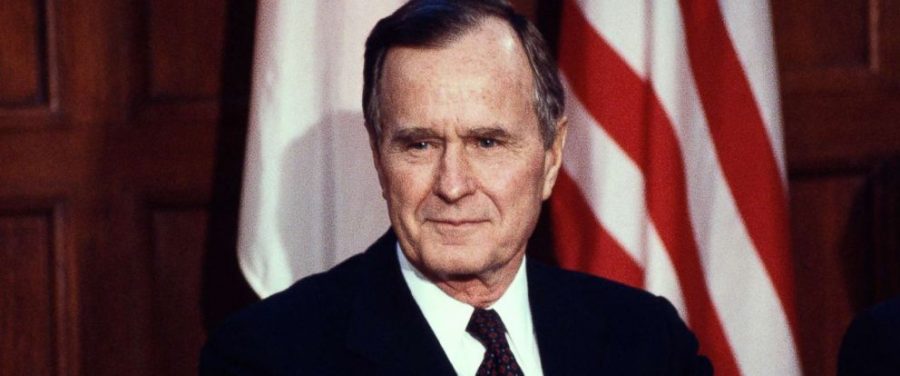Remembering a President
On November 30, 2018, George Herbert Walker Bush was laid to rest in the U.S. Capitol. Media outlets across the political spectrum are praising our 41st President as one of the most under-appreciated commanders-in-chief in recent history. The Wall Street Journal highlighted his reputation as a remarkably decent, gentle leader and his status as the last President to serve in World War II. Even Slate Magazine, despite its fiercely liberal status, went so far as to say Bush did a better job as president than either Ronald Reagan or Bill Clinton.
Bush presided over the fall of the Berlin Wall, the dissolution of the Soviet Union, and the successful introduction of a reunified Germany into NATO. Despite his infamous campaign promise of “no new taxes,” Bush responded to a growing deficit and feeble banking sector pragmatically, choosing to raise taxes and break with the GOP’s Reaganomics doctrine. He championed the Americans with Disabilities Act, which protected disabled Americans from discrimination.
Amid the showers of praise, however, Vox published an article reminding us that eight women have accused the late President of sexual harassment. I shared this article on social media and was quickly met with hostility from several of my peers (all of them male).
“Really?” one asked. “This couldn’t have waited until maybe after he was even buried?”
Another commented, “[He] has no chance to defend himself.”
The latter is just not true. These allegations have been public since last year. It is true that some of the women implicate Bush in groping them in recent years, by which point he was nearing death and had likely lost significant cognitive function.
However, one dates back as far as the President’s 1992 reelection campaign, and another woman claims Bush groped her in Kennebunkport in 2003, when she was sixteen years old. While by no means definitively proven, several of these eight allegations (not a small number) have been corroborated. Even more notably, Bush spokespersons choose to dodge rather than deny them.
But my objective here is not to debate the validity of these allegations. I am more concerned with the first negative response my sharing the Vox article.
When any major public figure passes away, the media spends the days that follow reflecting on their legacy. In George H.W. Bush’s case, that reflection has been overwhelmingly positive. He deserves that. He was a better leader, both at home and abroad, than we gave him credit for in life.
But he was an American President, and it is impossible that job well one hundred percent of the time. In 1988, Bush bested Democratic nominee Michael Dukakis through blatant race-baiting that perpetuated the image of the black male criminal. In 1991, Bush supported his Supreme Court nominee, Clarence Thomas, even after Anita Hill accused him of sexual harassment.
This, combined with his own questionable history with sexual misconduct, cemented his presidency as distinctly anti-feminist and set a depressing precedent for how the accusations by women like Hill — and now Christine Blasey Ford — should be treated in the judicial process.
Some might accuse me of partisanship in my criticism of George H.W. Bush, but my opposition to the GOP has nothing to do with it. All Presidents, Democrats and Republicans, deserve to be remembered in a truthful, comprehensive, and unbiased way. When Jimmy Carter passes, we should reflect on his poor political maneuvering just as much as his environmental initiatives.
Bill Clinton’s death will bring cautionary lessons regarding his role in the growth of super-max prisons, mandatory minimum sentencing, and his abuse of power in the Monica Lewinsky affair.
George W. Bush’s presidency was a disaster of foreign and economic policy, and that cannot be forgotten in death.
And while Barack Obama was arguably the greatest American President since Franklin Roosevelt, his passing will not mean we should ignore his record deportation numbers or his role in Middle Eastern drone strikes.
The question is this: should the negative parts of one’s legacy be put aside out of respect for the dead?
I say no. In the discussion of legacy that follows the death of any President, we must acknowledge all the parts of their story — successes and failures alike. President Bush’s mistakes are no less relevant than his many triumphs. To disregard them is to whitewash history.

After writing for The Banner as a junior, Duncan Glew '19 is excited to be co-managing The Banner this year with fellow senior Hannah Triester. Outside...


